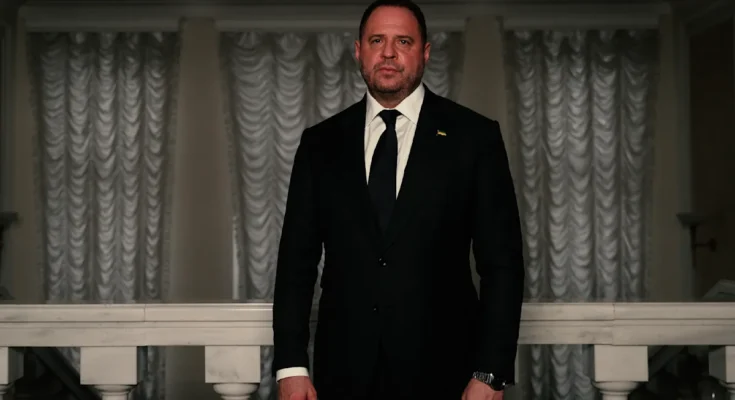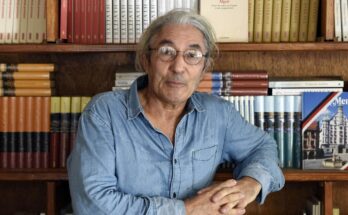Serious corruption allegations are rocking Ukraine. Suspected: several of Zelensky’s ministers and associates. Head of the Presidential Office Andriy Yermak defended Zelensky – and suspected political instrumentalization.
The head of the Ukrainian Presidential Office, Andriy Yermak, criticized the publication of the results of the investigation following the alleged corruption scandal in Ukraine. Of course the people involved in this cannot remain in power. But this needs to be based on facts, not manipulation, Jermak said in an exclusive interview with WELT and Axel Springer Global Reporters Network in Kiev. In this context, he warned against political exploitation of the case.
At the same time, Yermak defended Ukrainian President Volodymyr Zelensky and denied involvement in the scandal. “He’s a very principled person. He’s not corrupt. And that’s very important – a leader who declares war on corruption must be a non-corrupt person.”
Since the start of this week, Ukraine has been rocked by the most serious corruption allegations since Russia’s full-scale invasion. The anti-corruption agency NABU uncovered an alleged bribery system in the energy sector and the embezzlement of around 87 million euros. The investigation lasted 15 months and included hundreds of hours of wiretapped conversations.
Zelensky is under pressure because his suspects include not only former ministers in his government who served until a few days ago, but also the president’s former business partner, Timur Minditsch. Minditsch is one of the owners of a production company that Zelensky once founded. This caused a stir in Ukraine because Minditsch fled abroad shortly before the search – and may have been warned beforehand. Investigators also targeted Zelensky’s Justice Minister, Herman Halushchenko, who was temporarily suspended on Wednesday.
Jermak explained in an interview with WELT that anyone who was “even slightly to blame” in this scandal must be held accountable. At the same time, Zelensky’s confidant criticized what he saw as the premature naming of a suspect in public. “Why do some media mention names before there is real evidence or a court decision? That is also part of the legal process,” said Yermak, who spoke about the potential damage to his reputation – including to President Zelensky.
“Just look at how the campaign against President Zelensky started in 2019: the same thing. They said, ‘He’s a friend of Kolomoisky. He’s close to Kolomoisky.’ But Kolomoiskyi is in prison. Let’s look at the facts.” Kolomoisky is one of Ukraine’s most influential oligarchs and supported Zelensky in the 2019 election campaign. Three years ago – during Zelensky’s term – he was arrested as part of a fraud investigation.
A power struggle has been going on for a long time in Ukraine between investigators from the NABU anti-corruption office and parts of Zelensky’s government. Last summer’s nationwide protests were sparked by legislation planned at the time intended to weaken NABU and its associated prosecutor’s office, SAPO. Zelensky only gave up when the protests grew bigger and European heads of state such as Chancellor Friedrich Merz became involved. Finally, Parliament passed a new law providing comprehensive guarantees for the independence of anti-corruption authorities.
“Completely free investigation”
Regarding the current scandal, Yermak spoke about a “completely free investigation” that shows that Ukraine’s anti-corruption authorities can work independently. However, when asked whether he considered the allegations a political campaign against Zelensky or against himself, the head of the presidential office replied: “Let’s wait and see how this investigation ends. There are definitely political forces exploiting it. Of course. I see it. Absolutely. And don’t forget, we are still at war. And of course Russia is taking advantage of that.”
At the heart of the current corruption scandal is an alleged fraud scheme at the state-owned nuclear power company Energoatom. According to investigators, the company that received the order there should have had to return some of the money – a bribe of up to 15 percent of the order value. Some of these contracts involve the construction of protective facilities designed to safeguard Ukraine’s energy infrastructure from Russian attack. This sparked outrage in Ukraine, as Russia once again systematically attacked its energy system this winter and many people in the country only had electricity for a few hours a day due to the damage.
On the night of Thursday to Friday, Russia again attacked Ukrainian cities with long-range drones, cruise missiles and ballistic missiles. From midnight onwards there were attacks and shelling by Ukrainian anti-aircraft defenses in Kiev.



